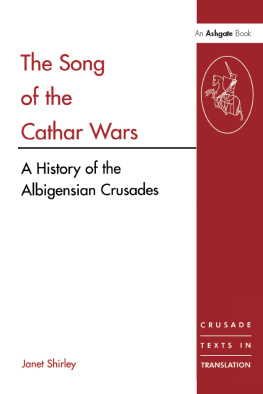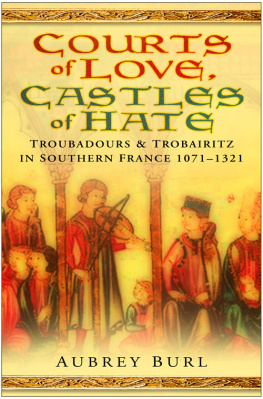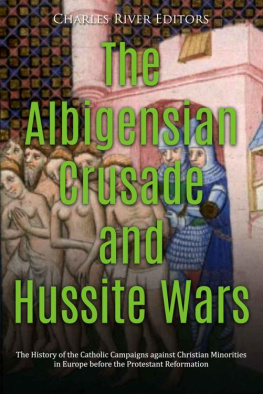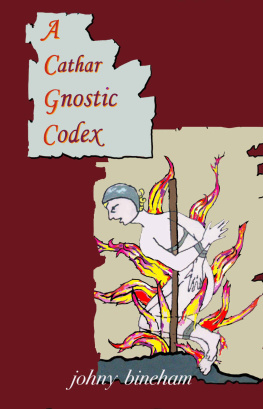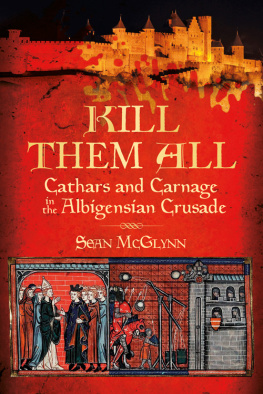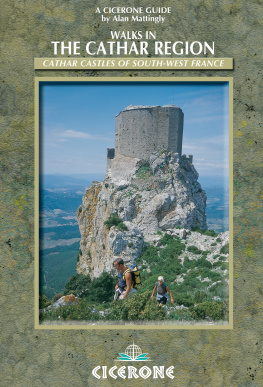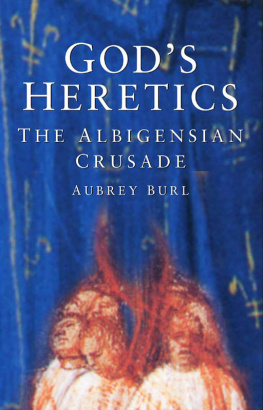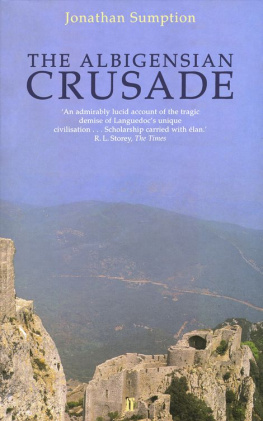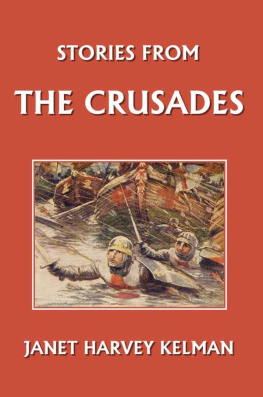The Song of the Cathar Wars
Crusade Texts in Translation
Editorial Board
Malcolm Barber (Reading), Peter Edbury (Cardiff),
Bernard Hamilton (Nottingham), and Norman Housley (Leicester)
Titles in this series include:
Peter W. Edbury
The Conquest of Jerusalem and the Third Crusade
Sources in translation
In paperback
Helen J. Nicholson
The Chronicle of the Third Crusade
A translation of the
Itinerarium peregrinorum el gesta regis Ricardi
Tom Asbridge and Susan Edgingion
Walter the Chancellors Antiochene Wars
Janet Shirley
Crusader Syria in the 13th Century
The Rothelin continuation of William of Tyre
with part of the Eracles or Acre text
and forthcoming
Donald Richards
The Rare and Excellent History of Saladin
being the al-Nawadir al-Sultaniyya wal-Mahasin al-Yusufiyya
of Baha al-Din Ibn Shaddad
Janet Shirley and Peter Edbury
Guillaume de Machaut: The Capture of Alexandria
Paul Crawford
The Templar of Tyre
First published 1996 by Ashgate Publishing
Paperback edition published 2000
Published 2016 by Routledge
2 Park Square, Milton Park, Abingdon, Oxon OX14 4RN
711 Third Avenue, New York, NY 10017, USA
Routledge is an imprint of the Taylor & Francis Group, an informa business
Copyright Janet Shirley, 1996
Janet Shirley has asserted her moral right under the Copyright, Designs and Patents Act 1988 to be identified as the author of this work.
All rights reserved. No part of this book may be reprinted or reproduced or utilised in any form or by any electronic, mechanical, or other means, now known or hereafter invented, including photocopying and recording, or in any information storage or retrieval system, without permission in writing from the publishers.
Notice:
Product or corporate names may be trademarks or registered trademarks, and are used only for identification and explanation without intent to infringe.
British Library Cataloguing in Publication Data
William, of Tudela
The Song of the Cathar Wars: A History of the Albigensian Crusade.
1. Narrative poetry, Provenaltranslations into English. 2. Narrative poetry, Englishtranslated from Provenal. 3. Provenal poetryto 1500translations into English. 4. English poetrytranslated from Provenal. 5. Albigensespoetry.
I. Title, II. Shirley, Janet.
841.030901
Library of Congress Cataloging-in-Publication Data
Guillaume, de Tudle, fl. 12101213.
[Chanson de la croisade albigeoise. English]
The song of the Cathar wars: a history of the Albigensian Crusade/William of Tudela and an anonymous successor: translated by Janet Shirley.
p. cm. Includes index. (Cloth)
1. AlbigensesPoetry. 2. FranceHistoryPhilip II Augustus, 11801223Poetry. 3. Languedoc (France)HistoryPoetry.
I. Shirley, Janet. II. Title.
PC3340.G84C4131996
84912dc20
ISBN 13: 978-0-7546-0388-7 (pbk)
The poem offered here in translation tells the story of events in Languedoc between the years 1204 and 1218, events known to us as the Albigensian Crusade. Exhorted to do so by the Church, warriors from the Ile de France and northern Europe rode south in order to exterminate heresy and acquire wealth, and were vigorously resisted by men and women of Languedoc, now often called Occitania. This was not yet part of France, and much of it had closer links with the realms of Aragon or Navarre than with the small French kingdom far away in the north. In August 1209 a French baron, Simon de Montfort, was chosen to command the military attack. His principal opponent was Raymond VI, count of Toulouse.
The crusade was launched and strongly supported by Pope Innocent III in order to stamp out the dualist heresy then flourishing in Languedoc. Most writings by these heretics have long since perished, so that the surviving evidence is mainly provided by their enemies, but it seems clear that Cathars believed in the existence not of one supreme God but of two gods who were equally powerful, one good and one evil; that they regarded everything physical as belonging to the evil god, and therefore to be abstained from wherever possible - no wealth, no sexual intercourse, no eating of meat and as little as possible of any other food. They also held that the Roman Church had been founded by the evil god to frustrate the work of Christ (Bernard Hamilton, The Albigensian Crusade), and that Christ did not really die on the cross and therefore did not need to rise from the dead. Their own name for themselves, Cathars, meant those who are pure, cleansed, and their preachers went about from place to place not only teaching but demonstrating a Christ-like love of poverty and abstention from worldly lusts. It was in response to this challenge that St Dominic began his great career, himself adopting a life of poverty and preaching. Here too are the origins of the Inquisition, for in the early 1230s the Church established this tribunal as a more systematic means of heresy-hunting.
This account of the crusade against the Cathars or Albigenses - people of Albi, a stronghold of the heresy - has no surviving title, except that in his opening lines the first author refers to la cansos que maestre Guilhems fit, the song which Master William made. There were two authors, William, who tells us something about himself in his opening lines and in laisse 9, and a man whose name we do not know who picked up Williams work almost in mid-sentence and carried it magnificently on from an entirely different point of view. The change-over occurs between laisses 131 and 132, after about one third of the text.
William of Tudela, the first author, supported the papacy and the northern French and their allies, although with some qualms now and then at particular acts of cruelty. His anonymous continuer, however, is whole-heartedly on the side of the southerners. This does not mean that he supported heresy; on the contrary, he indignantly denies that any of his heroes were guilty of such an error and asserts their orthodoxy. So did they, and it is noteworthy that the most frequent accusation brought against Raymond of Toulouse was not that he was himself a heretic, but that he was not sufficiently hard on heretics among his vassals.

